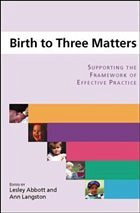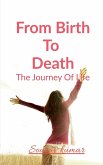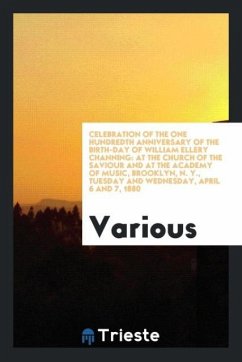Schade – dieser Artikel ist leider ausverkauft. Sobald wir wissen, ob und wann der Artikel wieder verfügbar ist, informieren wir Sie an dieser Stelle.
- Broschiertes Buch
- Merkliste
- Auf die Merkliste
- Bewerten Bewerten
- Teilen
- Produkt teilen
- Produkterinnerung
- Produkterinnerung
"The quality of children's experiences, and the engagement of their parents, particularly in these early years, is critical to better outcomes that will impact on the child right into adolescence and adulthood. While we have done much to expand quantity, we also must keep working on quality. This book is a key tool for both practitioners delivering services and managers designing and commissioning them." Naomi Eisenstadt, Director, Sure Start Unit, Department for Education and Skills Birth to Three Matters is essential reading for anyone involved in providing care and education or developing…mehr
Andere Kunden interessierten sich auch für
![The continental reformation in Germany, France and Switzerland from the birth of Luther to the death of Calvin The continental reformation in Germany, France and Switzerland from the birth of Luther to the death of Calvin]() Alfred PlummerThe continental reformation in Germany, France and Switzerland from the birth of Luther to the death of Calvin18,99 €
Alfred PlummerThe continental reformation in Germany, France and Switzerland from the birth of Luther to the death of Calvin18,99 €![From Birth To Death From Birth To Death]() Sourav KumarFrom Birth To Death11,99 €
Sourav KumarFrom Birth To Death11,99 €![The continental reformation in Germany, France and Switzerland from the birth of Luther to the death of Calvin The continental reformation in Germany, France and Switzerland from the birth of Luther to the death of Calvin]() Alfred PlummerThe continental reformation in Germany, France and Switzerland from the birth of Luther to the death of Calvin19,99 €
Alfred PlummerThe continental reformation in Germany, France and Switzerland from the birth of Luther to the death of Calvin19,99 €![A discourse on trade, and other matters relative to it A discourse on trade, and other matters relative to it]() John CaryA discourse on trade, and other matters relative to it18,99 €
John CaryA discourse on trade, and other matters relative to it18,99 €![Celebration of the One Hundredth Anniversary of the Birth-Day of William Ellery Channing Celebration of the One Hundredth Anniversary of the Birth-Day of William Ellery Channing]() VariousCelebration of the One Hundredth Anniversary of the Birth-Day of William Ellery Channing18,99 €
VariousCelebration of the One Hundredth Anniversary of the Birth-Day of William Ellery Channing18,99 €![A Private Proof Printed in Order to Preserve Certain Matters Connected with the Boston Branch of the Perkins Family A Private Proof Printed in Order to Preserve Certain Matters Connected with the Boston Branch of the Perkins Family]() Augustus Thorndike PerkinsA Private Proof Printed in Order to Preserve Certain Matters Connected with the Boston Branch of the Perkins Family18,99 €
Augustus Thorndike PerkinsA Private Proof Printed in Order to Preserve Certain Matters Connected with the Boston Branch of the Perkins Family18,99 €![Celebration of the one hundredth anniversary of the birth-day of William Ellery Channing Celebration of the one hundredth anniversary of the birth-day of William Ellery Channing]() VariousCelebration of the one hundredth anniversary of the birth-day of William Ellery Channing17,99 €
VariousCelebration of the one hundredth anniversary of the birth-day of William Ellery Channing17,99 €-
"The quality of children's experiences, and the engagement of their parents, particularly in these early years, is critical to better outcomes that will impact on the child right into adolescence and adulthood. While we have done much to expand quantity, we also must keep working on quality. This book is a key tool for both practitioners delivering services and managers designing and commissioning them." Naomi Eisenstadt, Director, Sure Start Unit, Department for Education and Skills Birth to Three Matters is essential reading for anyone involved in providing care and education or developing policy for children between birth and three. The book: * Explores the structure and content of the DfES Birth to Three Matters Framework * Supports the use of the pack by providing more detail, background information, and discussion of current research and case studies in Early Years * Examines a range of issues that impact on the development of quality in early years settings * Features contributions from influential early years experts, many of whom were involved in the development of the Birth to Three Matters Framework Topics include national and international policy and research, practitioners, quality, anti-discriminatory practice, inclusion, safety, and training. A sound theoretical approach is supported and enhanced by a highly practical section, which links to the framework and shows how how observation, play, interaction and creativity affects work with very young children. This book supports a variety of professionals involved in the development of policy, practice and quality in early years settings, as well as students seeking to understand more about the Birth to Three Matters Framework and the issues that influence work with this age group.
Produktdetails
- Produktdetails
- Verlag: McGraw-Hill Publishing Company
- Seitenzahl: 198
- Erscheinungstermin: Dezember 2004
- Englisch
- Abmessung: 229mm x 151mm x 14mm
- Gewicht: 327g
- ISBN-13: 9780335215409
- ISBN-10: 0335215408
- Artikelnr.: 21659286
- Herstellerkennzeichnung
- Libri GmbH
- Europaallee 1
- 36244 Bad Hersfeld
- gpsr@libri.de
- Verlag: McGraw-Hill Publishing Company
- Seitenzahl: 198
- Erscheinungstermin: Dezember 2004
- Englisch
- Abmessung: 229mm x 151mm x 14mm
- Gewicht: 327g
- ISBN-13: 9780335215409
- ISBN-10: 0335215408
- Artikelnr.: 21659286
- Herstellerkennzeichnung
- Libri GmbH
- Europaallee 1
- 36244 Bad Hersfeld
- gpsr@libri.de
List of Contributors Lesley Abbott is Professor of Early Childhood Education at the Institute of Education at Manchester Metropolitan University. She directed the Birth to Three Matters Project for the DfES. She also directed the earlier research project Educare for the Under Threes, which resulted in the training and resource materials Shaping the Future ¿ Working with the Under Threes. She has a background in primary and early childhood education and has worked in teacher education and multidisciplinary training for many years developing one of the first Early Childhood Studies degrees. She has served on a number of government committees and contributed to conferences nationally and internationally. She has worked in Australia, Singapore and Ireland and has published widely in the early years field. Publications include Working with the Under Threes ¿ Training and Professional Development and Working with the Under Threes ¿ Responding to Children¿s Needs and Early Education Transformed with Helen Moylett and, co-edited with Gillian Pugh, Training to Work in the Early Years, Developing the Climbing Frame. She is currently directing the Birth to Three Training Matters Project funded by the Esm¿Fairbairn Foundation and recently received a Lifetime Achievement Award alongside Lesley Staggs. Ian Barron is Principal Lecturer in Early Childhood Education at the Manchester Metropolitan University. He is a member of the national Early Childhood Studies Degrees Network. He has had a variety of experiences in the early childhood field, including work in primary schools in inner London and Leeds and headship of a nursery school in Lancashire and of an infant school in Calderdale. Ian has also provided in-service and advisory services for a number of LEAs and has contributed to the development of early years curriculum guidelines and was a member of the project team that developed the Birth to Three Matters Framework. He has also worked in a further education college, as an OFSTED Registered Inspector (Primary) and in a college of higher education. His research interests and journal publications are in the areas of early literacy, training of early childhood workers and constructions of childhood. Tina Bruce is Honorary Visiting Professor at the University of Surrey Roehampton. Her contribution over the years includes international work in the USA, New Zealand and Europe, and the influence of her specialist training working with children with SEN and disability and their families is promoting inclusion. Tina has brought a Froebelian perspective on government committees, including developing the Curriculum Guidance for the Foundation Stage, the Foundation Profile and the Birth to Three Matters Framework. She is author of numerous best selling books, including Childcare and Education, Learning Through Play: Babies, Toddlers and the Foundation Years and Developing Learning in Early Childhood. She is editor of Early Childhood Practice: The Journal for Multi-Professional Partnerships. She, with Jean Ensing, CBE, recently received the Lifetime Achievement Award at Early Years, 2002. Tricia David is Emeritus Professor of Education at Canterbury Christ Church University College, having officially retired in 2002. She was a Professor of Education at Canterbury Christ Church University College for seven years and prior to that worked at Warwick University for ten years, having been a headteacher of both nursery and primary schools earlier in her career. Triciäs research and writing is mainly concerned with the earliest years (birth to age 6). Her publications include thirteen books (single authored or edited by her) and around one hundred journal articles and chapters in books. Tricia is known internationally for her work with l¿Organisation Mondiale pour l¿Education Prescolaire (OMEP) and for the OECD, for whom she recently acted as rapporteur of their study of Early Childhood Education and Care in the Netherlands, reported in Starting Strong (2001: OECD). She was greatly assisted by her five grandchildren in her work for the Birth to Three Matters project. Pat Djemli is now a Senior Educare Adviser for Staffordshire Early Years and Childcare Unit. Until recently she was the Care Manager at Tamworth Early Years Centre. Her chapter in this book was written with Helen Moylett while they were both still working at Tamworth. Her management responsibilities at the Centre included working with the under threes and family support. Pat has worked as a nursery nurse and manager in various settings. Before moving to Tamworth Early Years Centre she was the Manager of a social services day nursery and has many years of experience working in day care. She has developed parenting programmes and other family support packages which are used across the county. She contributed to ¿Ten Steps to Five¿ (1997) Staffordshire¿s developmental record for under-5s. Pat is an NVQ Level 3/4 assessor and has almost finished her own NVQ Level 5 in Operational Management. She has a particular interest in young children¿s views on provision and as an advanced skills practitioner was leading the centre¿s work on the Esm¿Fairbairn funded Birth to Three Training Matters Project. Bernadette Duffy is Head of the Thomas Coram Early Childhood Centre in Camden, which has been designated as a Sure Start Children¿s Centre by the DfES. The Centre offers fully integrated care and education for young children in partnership with their parents and the local community. Bernadette was a valued member of the Working Group for the Birth to Three Matters Project. She was also part of the Qualification and Curriculum Authority (QCA) Foundation Stage working party which devised the Guidance for the Foundation Stage and had a particular input into the section on creative development. She is currently involved in an extension to the QCA¿s Creativity: Find it: Promote it. Bernadette is Vice-Chair of the British Association for Early Childhood Education, a fellow of the Royal Society of Arts, a member of the DfES Early Education Advisory Group and the Primary Education Study Group. Bernadette has contributed to a number of publications and is author of Supporting Creativity and Imagination in the Early Years, published by Open University Press. Peter Elfer is Senior Lecturer in Early Childhood Studies at Roehampton University of Surrey. He has undertaken a number of studies of children under three in nursery provision and has recently published Key persons in Nursery: Building relationships for quality practice with Elinor Goldschmied and Dorothy Selleck. He was a member of one of the Birth to Three Matters working groups. Prior to joining Roehampton, he worked in the Early Childhood Unit at the National Children¿s Bureau. Peter¿s current research is looking at how different nurseries manage the emotional complexity of work with babies and children under-3, using the observation method discussed in his chapter in the book. Kathy Goouch is Team Leader for Early Years Education at Canterbury Christ Church University College. Her interest in young children¿s literacy has developed over many years teaching experience, which ranged from Kindergarten through the primary stages. Kathy¿s research focus is in early literacy, particularly in young children¿s ability to construct meaning through reading and mark making, and the teaching interactions that support this. Publications include Making Sense of Early Literacy (2000) with Tricia David and colleagues involved in the Early Literacy Links Project, and Young Children and Playful Language (with Teresa Grainger) in Teaching Young Children (1999) edited by Tricia David. Kathy is currently working with colleagues on research projects relating to creativity and writing, with a consortia of local schools. Julie Jennings is a trained teacher who has specialized in the care and education of children with special educational needs and disabilities. Her postgraduate training has been in working with children with learning difficulties and with visual impairment. She is also a Froebel trained early childhood teacher. Having taught for many years in special and mainstream schools and early years settings, Julie was Head of an LEA visual impairment service before joining RNIB. For RNIB, as Early Years Development Officer, she is taking the lead in promoting services, which will improve the range and quality of early childhood provision for children with a visual impairment from birth to five years, and their families. Rachel Holmes is a Senior Lecturer at Manchester Metropolitan University where she is both a Senior Lecturer and a part time Research Associate. She has a background in teaching in the Early Years and at Key Stage 1, but has developed an enthusiastic interest in inter-agency working and multiprofessional issues within the early years and has been Course Leader for the BA Early Childhood Studies Degree. Her teaching areas within the University include ¿Children¿s Rights¿, ¿The Individual and the Social in Childhood¿, ¿Teaching Studies¿ and ¿Constructions of Early Childhood¿. She has an MA in Arts Education and is currently doing a PhD, her research is focused around ways of building a therapeutic dimension into teaching and learning for trainee early childhood practitioners. Ann Langston is a freelance Early Years Consultant. With a background in Teacher Education and Nursery Nurse training, Ann has a wide experience of work and management in the early years. Formerly an Early Years Adviser in a local authority and a Senior Lecturer In Early Years Education; she has managed an Early Years Development and Childcare Partnership as well as having managed under fives provision in eight nursery centres and schools in an Early Years Service. Ann was a Project Team member, involved extensively in the development of the Birth to Three Matters Framework (DfES) and also managed the recent Birth to Three Matters Training of Trainers Programme (DfES), which included development of the Birth to Three Childcare Workforce materials. She has written a number of publications including curriculum guidelines, early years articles and revised a quality assurance scheme for use in under fives settings. She is currently Project Manager for the Esm¿Fairbairn funded Birth to Three Training Matters Project based at Manchester Metropolitan University. Helen Moylett is now a Regional Director for the Foundation Stage, working with local authorities in the West Midlands and the East of England. Until recently she was the Head of Tamworth Early Years Centre in Staffordshire. The Centre provides care and education for children aged one to four years and support for their families. Her chapter in this book was written with Pat Djemli while they were both still working at Tamworth. Earlier in her career Helen has been a junior, infant, nursery and home school liaison teacher, a senior advisory teacher and a senior lecturer in early years education at Manchester Metropolitan University. She has co-edited two books on the under-3s with Professor Lesley Abbott as well as Early Education Transformed (Falmer 1999). She contributed a chapter on early years education and care to S. Bartlett and D. Burton (eds) Education Studies: Essential Issues (Sage 2003) She was Chair of Stockport Early Years Development and Childcare Partnership from 1998-2000 and on the national steering group for the Birth to Three Matters Framework. John Powell is Senior Lecturer in Early Childhood Studies at the Institute of Education at Manchester Metropolitan University with particular interests in Child Protection, Equal opportunities, Children's Rights, Multiprofessional Perspectives, Professional development and Research. Currently the Second Year Leader of the BA (Hons) in Early childhood Studies and the Course Leader for two post graduate degree courses, he is also involved in teaching across a range of levels and subjects relating to childcare and child care practices. His earlier experience as a Social Worker and as a Team Manager in Education Welfare gave him experiences of direct work with families and young children. His current and past involvement in research includes DfES Evaluation of Early Years Excellence Centres and a Teenage Parents Project. He is currently involved with a local EYDCP in research on practices relating to 'touch' as a childcare practice. His PhD was concerned with the construction of identities in schools. Previous research includes work in Belfast and Kirklees. He has produced several articles and chapters for publications and contributed widely to international conferences. Sacha Powell is Senior Research Fellow in the Centre for Educational Research at Canterbury Christ Church University College. Her research interests, which are strongly influenced by having lived (studied and worked) in the People's Republic of China, include sociocultural constructions of childhood, education in the People's Republic of China, and family education, all with particular reference to the early years of childhood. She is presently engaged in a range of research projects whose foci include modern foreign language learning in primary schools, theoretical underpinnings of learning behaviour, young children¿s play, and Children's Fund activities in England. Previously, Sacha has worked at the University of Sussex, and the British Academy, and in early childhood settings and schools in England, China, Taiwan and Spain. Gillian Pugh has been Chief Executive of Coram Family since 1997, having previously worked for many years at the National Children¿s Bureau. Over the past 20 years she has advised governments in the UK and overseas on the development of policy for children, on coordination of services, on prevention and early intervention, on curriculum, and on parent education and support. Gillian was a founder member and is Chair of the Parenting Education and Support Forum and a trustee of the National Family and Parenting Institute. She is an advisor to the Children, Young People and Families directorate within the DfES. She has published many books including Contemporary Issues in the Early Years (three editions), Confident Parents, Confident Children and Preventative Work with Families. She co-edited with Lesley Abbott Training to Work in the Early Years ¿ Developing the Climbing Frame. Iram Siraj-Blatchford is Professor of Early Childhood Education at the Institute of Education, University of London. Iram has taught in over 30 countries. She was on the StartRight enquiry and has provided evidence on early education to the National Commission on Education, to local and national governments and the House of Commons Select Committee. She is the co-author of over 30 books, monographs and major published research reports and over a 100 chapters, articles and reports. She is co-director of the major DfES ten-year study on Effective Pre-school and Primary Education (EPPE 3-11) project (1997-2008) and of the Effective Pedagogy in the Early Years project. She is particularly interested in undertaking research which aims to combat disadvantage and to give children and families from these backgrounds a head start.
Contents Page
List of Contributors
Foreword DfES
Preface
Lesley Abbott and Ann Langston
Acknowledgements
Chapter 1
Ann Langston and Lesley Abbott
Framework Matters
Chapter 2
Ian Barron and Rachel Holmes
Aspects Matter
Chapter 3
Gillian Pugh
Policy Matters
Chapter 4
Tricia David, Kathy Goouch and Sacha Powell
Research Matters
Chapter 5
Helen Moylett and Pat Djemli
Practitioners Matter
Chapter 6
Ann Langston and Lesley Abbott
Quality Matters
Chapter 7
John Powell
Anti-Discriminatory Practice Matters
Chapter 8
Julie Jennings
Inclusion Matters
Chapter 9
John Powell
Safety Matters
Chapter 10
Peter Elfer
Observation Matters
Chapter 11
Tina Bruce
Play Matters
Chapter 12
Iram Siraj-Blatchford
Interaction Matters
Chapter 13
Bernadette Duffy
Creativity Matters
Chapter 14
Training Matters
Lesley Abbott and Ann Langston
List of Contributors
Foreword DfES
Preface
Lesley Abbott and Ann Langston
Acknowledgements
Chapter 1
Ann Langston and Lesley Abbott
Framework Matters
Chapter 2
Ian Barron and Rachel Holmes
Aspects Matter
Chapter 3
Gillian Pugh
Policy Matters
Chapter 4
Tricia David, Kathy Goouch and Sacha Powell
Research Matters
Chapter 5
Helen Moylett and Pat Djemli
Practitioners Matter
Chapter 6
Ann Langston and Lesley Abbott
Quality Matters
Chapter 7
John Powell
Anti-Discriminatory Practice Matters
Chapter 8
Julie Jennings
Inclusion Matters
Chapter 9
John Powell
Safety Matters
Chapter 10
Peter Elfer
Observation Matters
Chapter 11
Tina Bruce
Play Matters
Chapter 12
Iram Siraj-Blatchford
Interaction Matters
Chapter 13
Bernadette Duffy
Creativity Matters
Chapter 14
Training Matters
Lesley Abbott and Ann Langston
Contents Page
List of Contributors
Foreword DfES
Preface
Lesley Abbott and Ann Langston
Acknowledgements
Chapter 1
Ann Langston and Lesley Abbott
Framework Matters
Chapter 2
Ian Barron and Rachel Holmes
Aspects Matter
Chapter 3
Gillian Pugh
Policy Matters
Chapter 4
Tricia David, Kathy Goouch and Sacha Powell
Research Matters
Chapter 5
Helen Moylett and Pat Djemli
Practitioners Matter
Chapter 6
Ann Langston and Lesley Abbott
Quality Matters
Chapter 7
John Powell
Anti-Discriminatory Practice Matters
Chapter 8
Julie Jennings
Inclusion Matters
Chapter 9
John Powell
Safety Matters
Chapter 10
Peter Elfer
Observation Matters
Chapter 11
Tina Bruce
Play Matters
Chapter 12
Iram Siraj-Blatchford
Interaction Matters
Chapter 13
Bernadette Duffy
Creativity Matters
Chapter 14
Training Matters
Lesley Abbott and Ann Langston
List of Contributors
Foreword DfES
Preface
Lesley Abbott and Ann Langston
Acknowledgements
Chapter 1
Ann Langston and Lesley Abbott
Framework Matters
Chapter 2
Ian Barron and Rachel Holmes
Aspects Matter
Chapter 3
Gillian Pugh
Policy Matters
Chapter 4
Tricia David, Kathy Goouch and Sacha Powell
Research Matters
Chapter 5
Helen Moylett and Pat Djemli
Practitioners Matter
Chapter 6
Ann Langston and Lesley Abbott
Quality Matters
Chapter 7
John Powell
Anti-Discriminatory Practice Matters
Chapter 8
Julie Jennings
Inclusion Matters
Chapter 9
John Powell
Safety Matters
Chapter 10
Peter Elfer
Observation Matters
Chapter 11
Tina Bruce
Play Matters
Chapter 12
Iram Siraj-Blatchford
Interaction Matters
Chapter 13
Bernadette Duffy
Creativity Matters
Chapter 14
Training Matters
Lesley Abbott and Ann Langston








